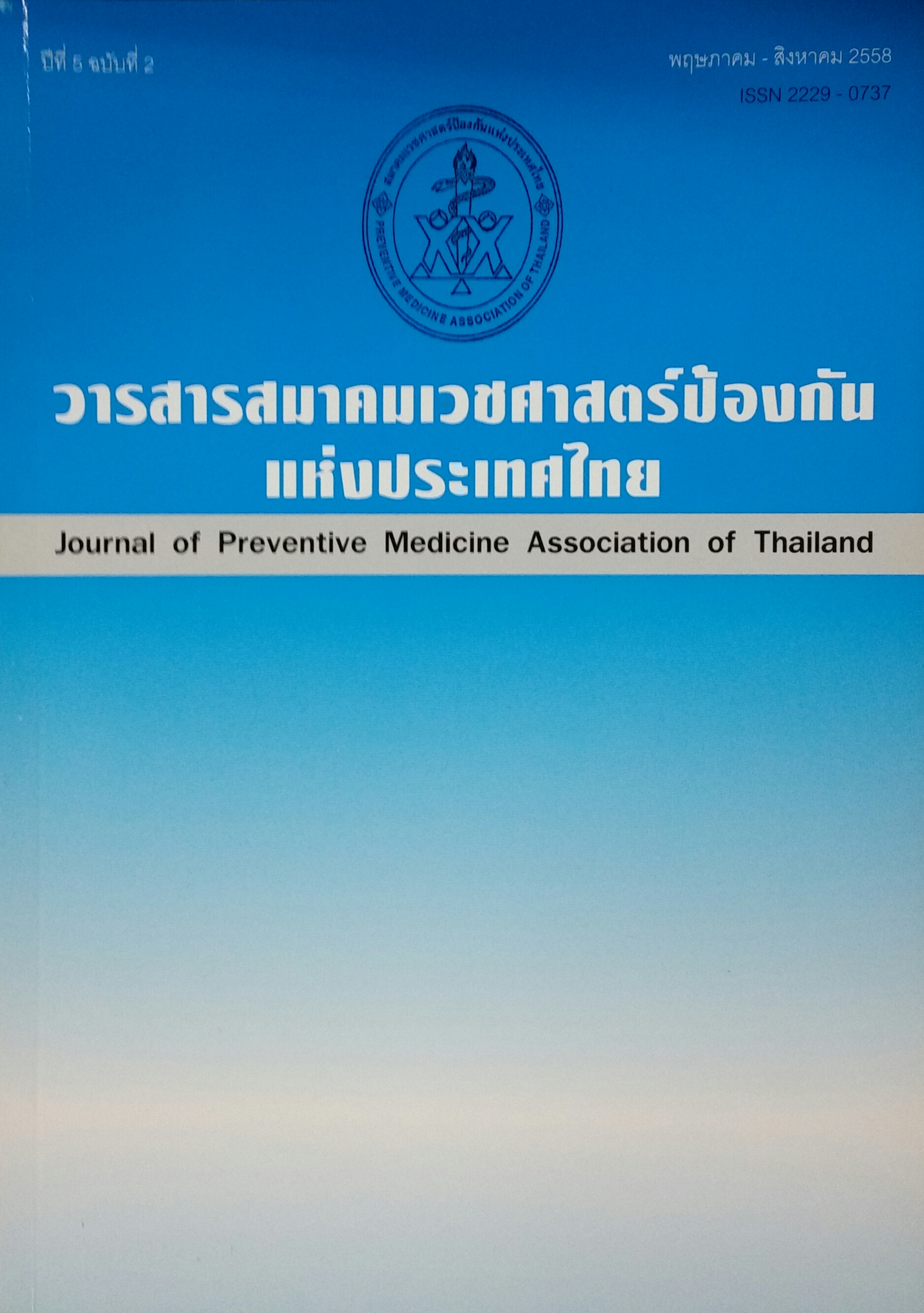Screening Program for Congenital Hypothyroidism in Sukhothai Hospital.
Keywords:
ภาวะพร่องธัยรอยด์ฮอร์โมนแต่กำเนิดAbstract
Congenital hypothyroidism is a condition of thyroid hormone deficiency, presents at birth. This disease leads to severe intellectual disability growth development and mental retardation when the human lacks of the hormonal supportive treatment. In Thailand, congenital hypothyroidism screening program has been conducted since 1991. This screening program of Thai government, the research was conducted since 1991. This screening program has been developed for congenital hypothyroidism detection by following up from pediatricians and for the prevention of this disease by providing supplement to pregnant women at antenatal clinic. The previous study found the incidence in Northern part of Thailand was 1:1703, and babies were repeat investigated for diagnosis only 40%. This screening program was applied in Sukhothai Hospital by blood testing of TSH (Thyroid Stimulating Hormone). The cutoff point level of this hormone is 25 mIU/L. If this hormone is more than the cutoff point level in the samples, the repeating blood examination of TSH and FT (Free thyroxine) was immediately reconfirmed. The results showed that 10,610 babies was delivery after birth between 48 hr and 7 days from Sukhothai Hospital during 2010-2015, and 10,404 (98.05%) babies were included in this investigation. 13 babies were detected for Congenital hypothyroidism, and the other 3 babies were detected for transient hypothyroidism due to maternal on thyroid hormone during pregnant by physicians. It was concluded that the incidence decreased from 1:816 to 1:1981 during 5 years. This may be from the visiting of all maternal at antenatal clinic before delivery has received the iodine supplement.
References
2. กรมอนามัย, สำนักส่งเสริมสุขภาพ. คู่มือการดำเนินงานการป้องกันภาวะปัญญาอ่อนจากภาวะต่อมธัยรอยด์บกพร่องและเฟ็นนิลคีโตนยูเรีย. กรุงเทพมหานคร:สำนักส่งเสริมสุขภาพ กรมอนามัย, 2550.
3. เกวลี อุณจักร. Congenital Hypothyroidism. ใน: เกวลี อุณจักร, อวยพร ปะนะมณฑา, สมจิตร์ จารุรัตนศิริกุล, สุภาพ อรุณภาคมงคล, บรรณาธิการ. Pediatric Endocrinology:Common Problem & Current Management. กรุงเทพฯ:บียอนด์เอ็นเทอร์ไพรซ์;2552. หน้า 79-86.
4. American Academy of Pediatrics,. Rose SR. Update of newborn screening and therapy for congenital hypothyroidism. Pediatrics 2006;117:2290-303.
5. เกวลี อุณจักร. Congenital hypothyroidism: Screening early intervention. ใน: สุทธิพงศ์ วัชรสินธุ, สมจิตร์ จารุรัตนศิริกุล, สุภาวดี ลิขิตมาศกุล, บรรณาธิการ. Guidelines for management & Case illustration in Pediatric Endocrinology. พิมพ์ครั้งที่ 1. กรุงเทพฯ:เท็กซ์ แอนด์ เจอร์นัล พับลิเคชั่น; 2545.
6. เกวลี อุณจักร. Neonatal Screening for Congenital Hypothyroidism. ใน: สมจิตร์ จารุรัตนศิริกุล, เปรมฤดี ภูมิถาวร, วิชิต สุพรศิลป์ชัย, สุภาพ อรุณภาค มงคล, บรรณาธิการ. Pediatric
Endocrinology: Practical Issues for Pediatricians. กรุงเทพฯ:บียอนด์เอ็นเทอร์ไพรซ์;2554.หน้า 143-52.
7. ศูนย์ปฏิบัติการการตรวจคัดกรองสุขภาพทารกแรกเกิดกรมวิทยาศาสตร์. สรุปผลปฏิบัติการการตรวจคัดกรองฯ ปีงบประมาณ พ.ศ. 2539-2555. [วันที่ค้นข้อมูล 12 กุมภาพันธ์ 2556]. แหล่งข้อมูล:www. neoscreening.go.th/web/images/stories/pdf/stat_th_update.pdf.
8. Stilwell G, Reynolds PJ, Parameswaran V, Blizzard L, Greenaway TM, Burgess JR. The influence of gestational stage on urinary iodine excretion in pregnancy. J Clin Endocrinal Metab. 2008:May;93(5):1737-42.
9. ภิศักดิ์ เลิศเรืองปัญญา, กิ่งพิกุล ชำนาญคง, พิมพาภรณ์ พรหมใจ, อัจฉรา วโรภาษ, วัชรชัย ไชยชะนะ. การเฝ้าระวังโรคขาดสารไอโอดีนจากระดับไอโอดีนในปัสสาวะของหญิงตั้งครรภ์ในเขตภาคเหนือตอนบน ปี 2553. วารสารการส่งเสริมสุขภาพและอนามัยสิ่งแวดล้อม 2555;35(4):41-53.
10. วิยะดา เจริญศิริวัฒน์. การคัดกรองสุขภาพทารกแรกเกิดของกระทรวงสาธารณสุข: ความเป็นมาของการคัดกรองสุขภาพทารกแรกเกิดในประเทศไทย. เอกสารประกอบการประชุมการประชุมสัมมนาเฉลิมพระเกียรติการคัดกรองภาวะพร่องธัยรอยด์ฮอร์โมนในทารกแรกเกิดเพื่อป้องกันภาวะปัญญาอ่อน; 25 พฤศจิกายน 2542; ณ ห้องประชุมกระทรวงสาธารณสุข. กรุงเทพมหานคร:กระทรวงสาธารณสุข;2542. หน้า 5-16.
Downloads
Published
How to Cite
Issue
Section
License
บทความที่ลงพิมพ์ในวารสารเวชศาสตร์ป้องกันแห่งประเทศไทย ถือเป็นผลงานวิชาการ งานวิจัย วิเคราะห์ วิจารณ์ เป็นความเห็นส่วนตัวของผู้นิพนธ์ กองบรรณาธิการไม่จำเป็นต้องเห็นด้วยเสมอไปและผู้นิพนธ์จะต้องรับผิดชอบต่อบทความของตนเอง






